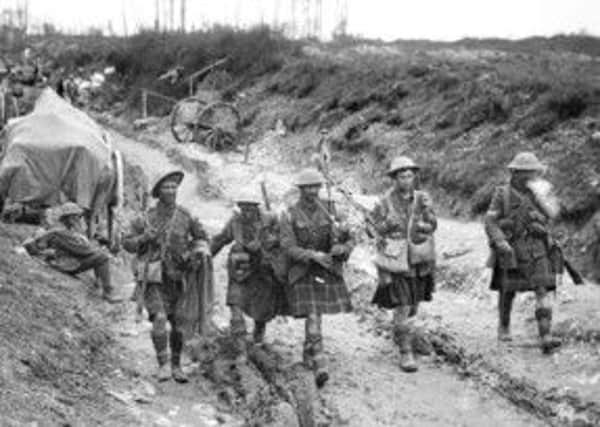Tunes of glory: heroism of Scots pipers reprised


Now the story of the pipers of the First World War is being retold, to celebrate the brave men who so often led the fight.
More than 2,500 pipers served, of whom 500 were killed and more than 600 wounded in places such as Ypres, the Somme, the Battle of Loos and Gallipoli.
Advertisement
Hide AdMany were in their 50s and also acted as stretcher bearers carrying the wounded from the fray. Some were awarded honours including the Victoria Cross and the Croix de Guerre.
The Germans, realising the vital role the pipers played spurring on attacks, even allocated snipers to kill them.
Historian Alistair McEwen, who is due to give a talk in April on the pipers as part of Scotland’s war commemorations, said: “The high death toll led the government to ban pipers leading their comrades into battle, but the pipers defied this order. Many battalions lost all their pipers more than once but there was never any difficulty in getting fresh men to take their place.”
McEwen began his research from a 1920 book, The Pipes Of War – A Record Of The Achievements Of Pipers Of Scottish And Overseas Regiments During The War 1914-18.
The first occasion on which pipers played troops into action is believed to have been at Givenchy on 25 January, 1915, when the 1st Black Watch suffered heavy casualties.
Among those highlighted in the book is Daniel Laidlaw of the 7th King’s Own Scottish Borderers, who was awarded the VC and Croix de Guerre for his bravery at Loos in 1915.
Advertisement
Hide AdLaidlaw played Blue Bonnets Over The Border as the Scots looked set to be gassed, and shouted: “Come on Borderers, who will be the first to reach the German trenches?” He only stopped playing when wounded, and then tended to injured comrades under fire.
A gripping account by an unnamed piper who played for the Cameron Highlanders at Arras reads: “I looked down at the company and I could see they were shaken. I slung my rifle over my back and took up the pipes; that cheered them. I played through two or three tunes and then birled up Tullochgorum. They fairly hooched it and stamped time. It was close on ‘zero’ when I changed to The March Of The Cameron Men. Our guns burst out with drum fire behind us and the men jumped the parapet like deer and raced over the broken ground at the double. I kept up The Cameron Men. I reached the first enemy trench; when I ‘stopped one’ with my leg, and down I went in a heap.’’
Advertisement
Hide AdAnother hero was piper Kenneth McLeman from Avoch, Ross-shire, who served in the Highland Light Infantry and was awarded the Distinguished Conduct Medal for bravery at Gallipoli. He tended the wounded after his pipes were shattered by shrapnel.
Yvonne McEwen, director of the Scotland’s War commemoration project, said: “The pipers’ story has been lost to the general history. The power of the pipes is motivational with a hint of superstition: in war soldiers hang on to things which promote courage and self-belief, as well as national identity.”
Robert Wallace, director of the College of Piping in Glasgow, said: “There is no more inspiring sound than that of the bagpipe. In the heat of battle the sound would have been like a voice from home.”
McEwen’s talk on pipers is at Portobello public library, Edinburgh, on 28 April.